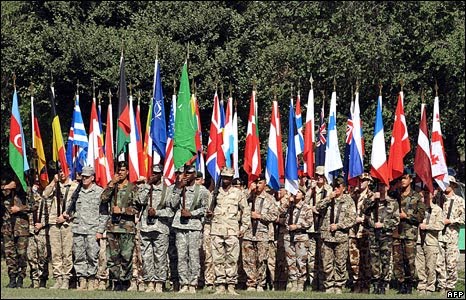
From Kori Schake, Newsweek: NATO’s membership has more than doubled to 28 countries since its inception in 1949, but its basic principle remains the same : “The Parties agree that an armed attack against one or more of them in Europe or North America shall be considered an attack against them all.” Only once in NATO’s 62-year history has its mutual-defense clause been invoked: after the Sept. 11 attacks on America. More than 10 years later, NATO allies continue to fight America’s fight, with 40,000 non-U.S. troops deployed in Afghanistan. That’s loyalty. Imagine how hard it would be for an American president to sustain involvement in someone else’s war after 10 years. . . .
Not all its member nations were enthusiastic about Libya; only 14 of them contributed forces to the operation. At the U.N., the Germans refused to vote for military intervention. They pulled their pilots from NATO planes and withdrew their ships from the area of operations. But when NATO took its own Libya vote, the Germans said yes.
And that’s why NATO is worth saving. A model has emerged, first in Kosovo and now in Libya: the NATO allies reach a collective judgment that intervention is needed in a conflict outside the member nations’ borders. Even if some members choose not to take part in that operation, their votes give validation to the members who are willing to fight. Some Americans may complain about the NATO members who didn’t fly strike sorties in Libya, but that misses the point: the NATO vote enabled the willing members to gain support both at home and internationally, and to get military assistance from the United States.
America’s political culture doesn’t require the approval of international bodies to act in defense of U.S. interests. In fact, in American presidential politics, a ritual proclamation of readiness to take unilateral military action is almost a precondition for becoming commander in chief. By contrast, the Europeans are much more respectful of international opinion. A NATO mandate can go a long way toward convincing them that military force is called for. It conveys the unanimous approval of 28 elected governments representing approximately 900 million people—the closest thing to a concert of democracies.
America may sometimes find its European allies tiresome, sanctimonious, and condescending. They contribute too little and expect too much. They often speak as if the United States were no different from its enemies around the world. Yet Europeans remain among America’s most reliable friends. Their commitment to human rights and democratic governance means they’re generally sympathetic to U.S. foreign-policy aims. Their militaries have been contributors in America’s wars, not just participants. And their long history of fighting beside the United States makes military teamwork relatively easy.
Nevertheless, Libya exposed serious flaws in the Europeans’ military power and political will. And those problems are not going away soon: the global financial crisis has put even greater strains on all the allies’ defense budgets, in Europe and America alike.
Still, the United States can’t afford to let its NATO partners slip away. No one else has the abilities and resources to accomplish what the alliance has done in Kosovo, Afghanistan, and Libya. No one else has the depth of shared values. NATO doesn’t matter only for Europe; it matters for the United States. Without NATO, the United States would have more work to do in the world, not less, and the burden on America’s military and taxpayers would be even heavier. We need to get working to repair our frayed alliance.
Kori Schake is a fellow at the Hoover Institution and an associate professor at the U.S. Military Academy. Her book State of Disrepair is coming out in February. (photo: AFP/BBC)
Image: afp%2012%2027%2011%20NATO%20troops.jpg
